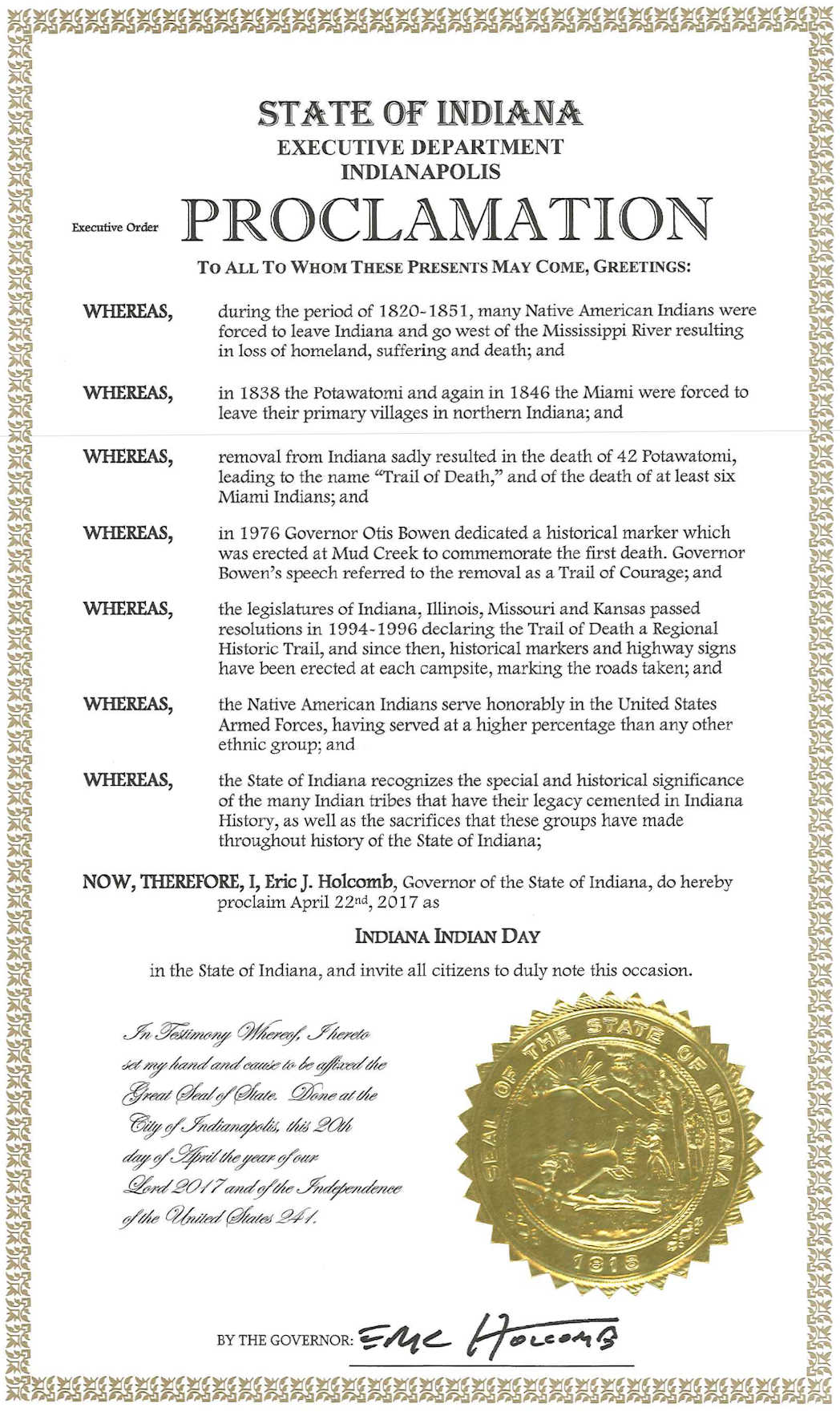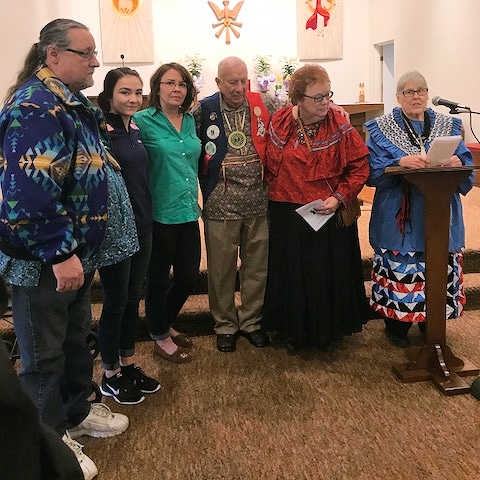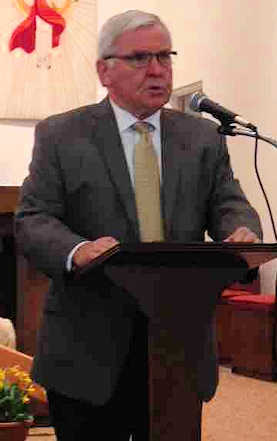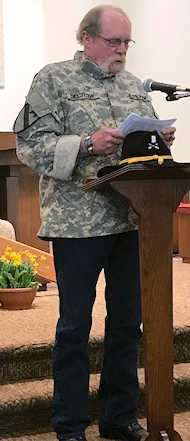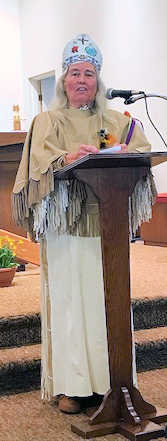|
Indiana Indian Day a step in right direction Indiana Indian Day was a step in the right direction but much remains to be done to get the state to apologize to the Native American Indians. I still hope Indiana will apologize and lead the other states to do the same. With its name that means “Land of the Indians,” Indiana should lead the way toward reconciling its history and its treatment of the Indians today. Two police cars stopped traffic in front of St Joseph Catholic Church at 2 p.m. April 22 so that Father Mike McKinney could bless Main Street and reclaim it for peace. Since Sept. 5, 1838, when the Potawatomi were marched at gunpoint down Main Street on the Trail of Death, people have felt evil on the street. Bill Friend, state representative of Fulton, Miami and Cass counties, read Governor Holcomb’s proclamation to begin the program. In my speech I noted that Indiana is suffering and trying to figure why, trying to get better. I can’t say God is punishing Indiana or all of America, but evil seems to grow where it gets a chance, a foot hold. And it is pretty certain that the world is suffering from all the evil that is alive and growing around the globe. Can Indiana apologize and still be proud of its accomplishments? Yes, because we are human and we do both good and bad things. What can Indiana do to make up to the Indians? Treat them better - equal to whites, allow Indian casinos and housing, accept responsibility. Evil was not invented by white people. There was evil everywhere in the world and all over America before white men came. Russell Means of American Indian Movement in the 1970s said that most of the modern world’s troubles were caused when the European white men ran amuck. The Doctrine of Discovery stated that explorers could plant their flag and claim new lands for their home country, regardless of the natives living there. I learned a lot from this program. For instance, I did not know that people protested the Removal Act, wrote articles, and held meetings to denounce Andrew Jackson for his part in getting the Removal Act passed by Congress. That sounds like some of the news of today, doesn’t it? We need to advocate for what we believe is right. We learned from Brian Buchanan, chief of the Miami Indians of Indiana, that they do a memorial walk every year the third weekend of October from their tribal headquarters in Peru to the river. He invited everyone to come and join them. On Oct. 6, 1846, the Miami were loaded on boats and taken to Western Territory which is Kansas today. George Schricker brought his guitar and his wife Michele taught the audience to sign the words as we sang Menominee. Bethany Christian School, Goshen, fourth graders performed a skit about Billy Ward, a young boy in Rochester, who tried to go with his little Potawatomi friends but his mother brought him back. Bob Pearl and Tracy Locke, who had ancestors on the Trail of Death, told their stories, passed down through the families. Joan Carpenter McClellan told about her Potawatomi mother, age 104, carrying a torch for Indiana Bicentennial. Kerry Steiner, Indiana Native American Indian Commission, told about the Indiana Indians of today. There are 40,000 to 60,000 Native American Indians in Indiana in many occupations including aerospace engineer. Unfortunately Indians are incarcerated at a high rate but the prisons have Native Circles to try to help them. Dan DeCrow, Rochester, read Wes Clark Jr.’s apology from the military to the Lakota: “We fought you. We took your land. We signed treaties that we broke. We stole minerals from your sacred hills. We blasted the faces of our presidents onto your sacred mountain. When we took still more land and then we took your children and then we tried to make your language and we tried to eliminate your language that God gave you, and the Creator gave you.” It was an amazing meeting with powerful messages. These people had told me their stories and I wanted to get them together to share and connect for future efforts. Maybe someone will organize an Indiana Indian Day next year. April 22 is proclaimed Indiana Indian Day ROCHESTER - Descendants of the Potawatomi and Miami tribes were given a formal apology for their ancestors being driven out of the state, which resulted in the Trail of Death, a forced emigration of Native Americans from Indiana to Kansas in the 1800s. On Saturday, community members gathered at St. Joseph Catholic Church in Rochester, Indiana, as the stories of the Potawatomi and Miami Indians and their forced removal were told. “There is an old Indian prophecy that a Great Awakening will start in Indiana and spread across the nation and world,” said Shirley Willard, event organizer and member of the Potawatomi Trail of Death Association. “We believe it has started.” The ceremony began with a blessing to reclaim peace by Father Mike McKinney in the very area the Potawatomi Indians were forced to leave. Main Street, which sits adjacent to the church, is where the tribe was marched at gunpoint out of the town.
“The state of Indiana recognizes the special and historical significance of the many Indian tribes that have their legacy cemented in Indiana history as well as the sacrifices that these groups have made throughout the history of Indiana,” the proclamation read. And for descendants of the two tribes, acknowledgement by government officials of the atrocities that took place in Sept. 1838 for the Potawatomi and in Oct. 1846 for the Miami, it means continued healing. The ceremony included stories and a play dedicated to the Potawatomi and Miami ancestors, performed by 4th graders from Bethany Christian (Mennonite) School. Descendants of both tribes were also given the opportunity to reflect on their heritage and what it meant to have the community come together in mourning and to ask for forgiveness. “For the governor to agree with the citizens, it’s a landmark,” said Brian Buchanan, Principal Chief of the Miami Nation of Indians of the state of Indiana. “It’s an epitome of citizenship in the state of Indiana right now and I thank the governor. Unfortunately, I don’t have that feeling with state legislation and haven’t for many, many years.” At least six Miami Indians died as a result of their journey before settling farther west. There were 42 known deaths from the Potawatomi tribe. And today, Native Americans still struggle to receive legislative support for their communities, Buchanan said. “That’s a good start, for the future to come, but we’re still fighting the same battles we were 25 to 30 years ago,” he said. “And I don’t see that changing anytime soon.” The event concluded with an emotional recital of an apology by all who were in attendance, as the descendants of the two tribes stood in place of their ancestors. “Therefore we, the citizens of Indiana, on behalf of the state of Indiana, do issue this formal apology to the Native American Indians whose ancestors were forced to leave Indiana,” the crowd read in unison. “We ask for your forgiveness, and pledge to tell the stories of this tragic part of our state’s history so that the suffering of your people may not be forgotten.”
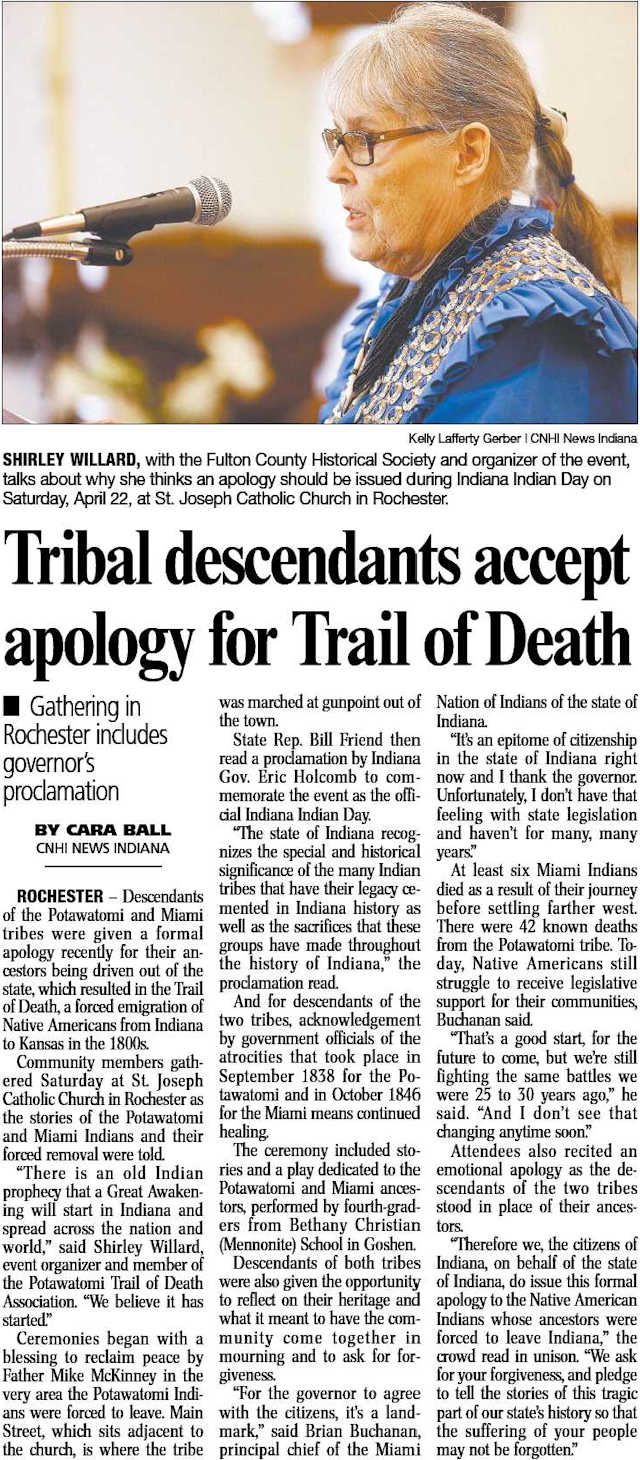
Indiana Indian Day Apologizes to Potawatomi and Miami Hoosiers are invited to join students, county historians, Mennonites, Catholics and others to attend Indiana Indian Day to apologize to Native American Indians on Saturday, April 22 in Rochester, Indiana. The apology is especially directed towards two tribes who were driven out of Indiana at gunpoint: the Potawatomi in Sept. 1838 on what is now called the Trail of Death and the Miami in Oct. 1846. Members of both tribes will attend this event in Rochester to tell their stories. All are invited to St. Joseph Catholic Church, 1310 Main Street, Rochester, at 2 p.m. on April 22. This is a free event and the public is invited. Because the Potawatomi were marched at gunpoint down Rochester’s Main Street, Father Mike McKinney will bless the street and reclaim it for peace. There were 42 deaths among the Potawatomi as a result of drinking creek water that spread typhoid fever. As the Fulton County Historian, Shirley Willard asked Governor Holcomb to issue an official apology for the forced removals mandated by the state. Kansas apologized to the Native American Indians in 2013 and Congress in 2010. See www.potawatomi-tda.org for information about the Trail of Death. Shirley Willard, 574-223-2352, Program for Indiana Indian Day
Apology from Indiana Citizens to Whereas, in the period of 1820-1851, many Native American Indians were forced to leave Indiana and go west of the Mississippi River so that white settlers could purchase their land, we acknowledge the loss of homeland, suffering, and death which resulted, and the deep depression that still exists. The Indiana government did not foresee the tragic results. Our hearts go out to the descendants and we wish to make a treaty of the heart with them. Whereas, in this year, following the Indiana Bicentennial, the 200th anniversary of Indiana’s becoming a state in 1816, we acknowledge the human error made by the Indiana Governor in 1838 in authorizeing militia to round up the Potawatomi and forcibly march them to Kansas. This forced emigration is known as the Trail of Death because over 40 died on the way and are buried in unmarked graves. Whereas, the Miami tribe was forced to leave Peru, Indiana, in October 1846, resulting in at least six deaths. Whereas, today’s Hoosiers regret these inhumane acts and wish it had never happened; we humbly express our sincere sorrow for this. Therefore we, the citizens of Indiana, on behalf of the state of Indiana, do issue this formal apology to the Native American Indians whose ancestors were forced to leave Indiana. We ask for your forgiveness, and pledge to tell the stories of this tragic part of our state’s history so that the suffering of your people may not be forgotten.
April 22, 2017, Rochester, Indiana
You are invited to sign this apology at the Fulton County Museum, Rochester, Indiana, which is open Monday - Saturday 9 to 5.
Apologize to Indians April 22 in Rochester, Indiana Students, county historians, Mennonites, Catholics and others invite you to attend Indiana Indian Day to apologize to Native American Indians on Saturday, April 22 in Rochester, Indiana. Two tribes were driven out of Indiana at gunpoint: the Potawatomi in Sept. 1838 and the Miami in Oct. 1846. Members of both tribes will attend this event in Rochester to tell their stories. All are invited to St. Joseph Catholic Church, 1310 Main Street, Rochester, at 2 p.m. April 22. Because the Potawatomi were marched at gunpoint down Rochester’s Main Street, Father Mike McKinney will bless the street and reclaim it for peace. Inside the church, students will tell stories of children on the Trail of Death. A jar of water from the Tippecanoe River will illustrate what they had to drink; 42 deaths in 1838 were a result of bad water that spread typhoid fever. Sympathetic women in Rochester gave the Potawatomi hoecakes to eat on their journey. There will be hoecakes for people to sample Planning began with Adam Friesen Miller, fourth grade teacher at Elkhart’s Bethany Christian (Mennonite) School, and Shirley Willard, Rochester, Fulton County Historian. Willard asked Governor Holcomb to issue a heartfelt official apology for forced removals on behalf of Indiana state government. Kansas has apologized to its natives in 2013, and the U.S. Congress apologized in 2010. ”If something needs to be done, don’t wait on the government - do it yourself,” is Willard’s motto. During the past 30 years Willard organized placing and dedicating over 80 historical markers on the 660-mile Potawatomi Trail of Death from Indiana to Kansas. She contacted Boy Scouts and Girl Scouts to erect over 30 markers. See www.potawatomi-tda.org for photos of 80 historical markers, 1838 diary, history of Father Petit who accompanied the Potawatomi on the Trail of Death in 1838 and St. Philippine Duchesne who served them as a missionary at Sugar Creek, Kansas, in 1841. People in north central Indiana have been meeting to share their concerns about the high suicide rate and how to improve the situation. Churches and discussion groups have been seeking answers through prayer. “There is an old Indian prophecy that a Great Awakening will start in Indiana and spread across the nation and world. We believe it has started,” Willard said. To educate the public, the film, “Like Birds in a Wind Storm” on DVD, has been sent free to over 300 schools, museums, libraries, churches, county historians and groups that will show it for programs. The film by Susan Green, YourStory Digital, Rochester, was made possible in cooperation with Citizen Potawatomi Nation, Shawnee, Oklahoma. For more information contact: Shirley Willard, 574-223-2352, Rochester IN 46975. Cost of the documentary is $15, which includes shipping. Send check to Potawatomi Trail of Death Assn., c/o Fulton Co. Hist. Soc., 37 E 375 N, Rochester, IN 46975. George Schricker tells of Native American philosophy George Schricker, Plymouth, is well known for his music and the songs he has written. George has met with many school children and groups at the Chief Menominee monument to present his program, along with me telling about the Potawatomi Trail of Death. In a letter to me today George explains his feelings and the teachings from his grandfather: ”My grandfather, Governor Henry F. ?Schricker, got me interested in Native American Indian history when I was a boy. I wrote the song about Chief Menominee in early 1982-83 after re-reading Daniel McDonald’s history of Marshall County. My grandfather told me he was deeply concerned about the failure of the governing race to integrate some of the most central teachings of the Native Americans into the culture--particularly their view that human gratefulness was a tool for increasing empathy and understanding with all of nature. You see this gratefulness expressed in so many of their ceremonies and prayers, and through this gratefulness you can sense (if you still treasure your senses) their authority and belonging-ness to the earth. Henry believed this Native American understanding-- that all the two-leggeds, and four leggeds, and wingeds--all the water, and fresh air, and the land were to be viewed as our relations, and were intimately connected not only to our well-being, but to our survival. This failure to maintain this grateful attitude to all of nature and the gifts of life and creation could be seen even in his lifetime (1883-1966, Governor 1941-45 and 1949-53) and he was concerned for the future of the children to come. He taught me that one of the tools for moving toward this integration was through active acts of atonement, and my writing of Menominee was a first attempt to move in this direction for myself. The writing of the song was a recognition of the tragedy for me, but more personally it was an attempt to understand what had happened and ask a sort of forgiveness for it. For me, the whole act of removing the Potawatomi was not just a land grab, it was a failure of imagination and a failure of Christ’s gospel of love. If we had let them remain, think what they could have taught us! Think how they could have helped right this attitude of viewing the land and all of nature as just a thing to be used up and thrown away. Surely the Potawatomi and their ancestors, long before St. Francis, had recognized--indeed had learned--that all of God’s creation is sent to be our teacher, to reveal God’s nature to us. And that when we ignore this central teaching we throw away awe, empathy, art, and poetry. And when we do this we diminish the wholeness and largeness of God. So, in this respect, acknowledging our history, and our culture’s complicity in this atrocity, is a step in the right direction--of giving God’s creation its due again. And this is indeed one of the central aspects of all of Native American culture and teaching. To me, a public apology is a long step in the right direction, and, it is a first step in the act of at-one-ment (at one with...the wronged party) with the Potawatomi and the creation we have been so gloriously gifted--a creation which we depend on for our children’s very survival. In this respect, the science of ecology is simply the re-integration of God’s creation into our cultural heritage and part of that integration depends on our making peace with our past.” George will sing his Menominee song at Indiana Indian Day on April 22 at 2 pm at St. Joseph Catholic Church, 1310 Main. There will be several other parts to the program which is free to the public. Join us to apologize for the forced removal of Native American Indians from Indiana. Adam Friesen, 4th grade teacher at Bethany Christian School, and I have been conferring on this. Please share this letter with your committee and let us know if you are willing to partner with us on Indiana Indian Day Apr. 22, as described below. Please reply what you decide. We hope your group will work with us on this project. Thanks. Shirley Letter from Shirley Willard, Fulton County Historian February 2017 We are embarking on a new project and invite you and your group to partner with us. Please show the DVD documentary about the Trail of Death, Like Birds in a Wind Storm, which we are offering to give to you for a program for your group. Chief Menominee was the leader of the resistance who refused to leave Indiana but Indiana Governor David Wallace came to investigate the disturbance. Some Indians had broken down a white man’s cabin door, and some white men had burned a wigwam. On his way back to Indianapolis, Indiana Gov. David Wallace stopped in Logansport and authorized General John Tipton to hire 100 volunteer militia and remove the Potawatomi from Indiana. They started out Sep 4 and camped the first night at the Tippecanoe River and Michigan Road (Old 31) north of Rochester. They were marched at gunpoint down Rochester’s Main Street Sep 5, 1838. The first death occurred at Mud Creek six miles south of Rochester. This became the Trail of Death: 42 died on the way to Kansas, about 100 escaped, and Father Benjamin Petit died on the way home to Indiana. I asked Gov. Mike Pence to issue an apology to the American Indians for all the forced removals from Indiana. Indiana means “Land of the Indians,” but they were forced to leave and go west. Pence declared Sep 20, 2014, as Potawatomi Trail of Death Remembrance Day. We were grateful for that but still hoping to get Indiana to apologize. This would not be without precedence. In 2013 Kansas Governor Sam Brownback apologized to the Potawatomi and other tribes for the unjust way they have been treated and their trails of tears. The United States Congress apologized to all the Indians in 2010. But it was attached to an appropriations bill and not publicized. When the Indians heard about it, they held a public reading but the news media did not pay much attention. I did not hear about it until 2013 when I saw it on the Internet. We have learned that if something needs to be done, don’t wait for the government - Do it yourself. Therefore we are asking you all to partner with us to plan and do a special day for all of us Indiana residents to acknowledge and apologize for the forced removals. We have picked Earth Day, Saturday, April 22, 2017, and are working on the plans. Because the Potawatomi were marched at gunpoint down Rochester’s Main Street, we feel this would be a logical place to hold this event. We could offer people the chance to park at the north end of Main Street and walk to the Catholic Church at 1310 Main, a distance of about 10 blocks. Instead of carrying rifles, they could bring scrolls with signatures of people who support the apology, including schools, clubs, churches, and groups. At the Catholic Church Fellowship Hall, we could have a ceremony and program. Ideas for the program: school children tell stories about children on the Trail of Death and other removals, offer hoecakes which is what Rochester housewives gave to the Potawatomi as they went through town in 1838, and show a clear jar of creek water, which was what they had to drink. We would also offer real cookies and good water for refreshments. George Schricker, Plymouth, will sing his “Menominee” song. We would declare that we the people of Indiana lament that the Native American Indians were forced by our government to leave Indiana. We are saddened and wish it had never happened. Please discuss this with your group and get back with me on your thoughts. Will you partner with us and get signatures? Will you be able to attend? Do you have ideas for the program? Will you pray for the success of this effort, that it will be healing and spiritual, not political? Shirley Willard, Fulton County Historian About Adam Friesen & 4th Graders Adam Friesen, 4th grade teacher at Bethany Christian School, Goshen, and I have been conferring on this program. This Mennonite School is very interested in the American Indians being driven from Indiana. There were many removals, from the Delawares in 1820 to the Miami in 1946, and Potawatomi in several removals - the worst being the Trail of Death in 1838. Removals continued until 1851, when Indiana decided it had removed all the Natives from Indiana. It became official state policy that all the Indians had left Indiana and this was taught in the school texts. I know because I taught 8th grade Indiana history at Kewanna School 1960-67. As Fulton County Historian I interviewed many senior citizens since 1982 and some had Indian ancestors. One man told me that when he and his brothers were kids walking to the one-room schools, the white children would sometimes throw rocks at them and call them “dirty rotten lazy Indians.” Others told me that their grandparents kept it a secret that they were of Indian descent because they were afraid they would be forced to go west and lose their land. Also white people treated them better if they did not know they were Indians. This is what Adam Friesen recently wrote me: I have been working quite a bit on our April 22nd event.
I agree that this is a time when people are yearning to hear this story. Thinking about how our community might have a presence at this event has been in the front of my mind since we talked back in November.
Shirley speaking again: Now I am inviting you to help with this event and get people to join us in apologizing to the Indians of Indiana, most of whom have left but had ancestors here. This is a big job and it scares me. I have felt for many years that God is calling me to get Indiana to apologize to the Indians. But I am 80 years old and had back surgery Jan 24, so I cannot no longer go around giving speeches and programs like I used to. If God wants us to do this, I pray He will send us helpers and move the hearts of those in power to feel the pull that we feel. I have cried many many times for the babies and all who died on the Trail of Death. This is what Millicent Pepion, Navajo from Arizona, said at Chief Menominee statue on their Trail of Broken Promises walk from Haskell Indian Nations University in Lawrence, Kansas, to Washington D.C. “The spirits of the dying babies on the Trail of Death did not know which way to go, back to Indiana or to an unknown place ahead.” Millicent and her friends sprinkled water at each place on the Trail of Death because 1838 was a year of terrible draught and the Indians cried “Bish bish” (water) as they walked in thirst. What water they found was stagnant and carried typhoid, that deadly fever that caused sores and killed over 40 Potawatomi on the 660 mile trek to Kansas in the fall of 1838. These are some of the stories that need to be told. Please talk to others and invite them to take part April 22 in Rochester for Indiana Indian Day. Help us spread the word, partner with us, help make this happen. Thank you. Some Indians say they don’t want an apology but equal rights and better living conditions. True, but I do not have the power to give that. And I think an apology is the first step. I know when someone has hurt me, I feel better if they apologize, even though it does not erase the sadness nor make things right. God is calling me to get Indiana to apology to the Indians. It needs to be done. Don’t you agree? Please email or write me your thoughts. Report Feb 22, from Shirley Willard We have been sending a free DVD of “Like Birds in a Wind Storm,” to Indiana county historians, museums, libraries, schools, interested people who say they will show it as a program to groups. We got 500 copies and they need to get out to interested people. Just give me the name and address and name of organization or group. We also sent copies to the 11 prisons in Indiana that have Native American Circles. I have heard back from many people on this project and they support it and want to help in whatever way they can. I talked to the local priest, Father Mike McKinney, of St. Joseph Church, Rochester, where we plan to have the Indiana Indian Day program at 2 p.m. April 22. Here are his suggestions.
What do you think of the above? Father Mike has been thinking about it and trying to figure how to help us. I emailed the Governor and applied for the Apology. But whether he apologizes or not, we will go ahead with Indiana Indian Day. I emailed Wes Clark Jr., the soldier who apologized to the Lakota, and invited him or if he cannot come, give us permission to have a local soldier read his apology to Chief Leonard Crow Dog. Clark’s apology is at the bottom of this page - it is on You Tube. Very moving and accurate. I also sent a DVD of “Like Birds in a Wind Storm” to Jane Pauley, on CBS Sunday Mornings and asked if she would do a story about it and our seeking an apology from Indiana government. Pauley is originally from Indianapolis.
Your suggestions are most welcome here. Just email me at A parade on Main Street was suggested but I am afraid of attracting protestors. We want this to be healing and spiritual, not political. Wes Clark Jr.’s Apology at Standing Rock (This is from the Internet Dec 5, 2016, on You Tube.) Wes Clark Jr., the son of retired U.S. Army general and former supreme commander at NATO Wesley Clark Sr., apologized to Lakota spiritual leader and medicine man Chief Leonard Crow Dog: “Many of us, me particularly, are from the units that have hurt you over the many years. We came. We fought you. We took your land. We signed treaties that we broke. We stole minerals from your sacred hills. We blasted the faces of our presidents onto your sacred mountain. When we took still more land and then we took your children and then we tried to make your language and we tried to eliminate your language that God gave you, and the Creator gave you. We didn’t respect you, we polluted your Earth, we’ve hurt you in so many ways but we’ve come to say that we are sorry. We are at your service and we beg for your forgiveness.” Hoosiers plan to apologize to Indians April 22 at Rochester Many people in northern Indiana are planning a special event, Indiana Indian Day, to apologize to the Native American Indians. These people include Mennonites, Catholics and other churches, county historians, museums and schools. There were 14 tribes native to Indiana but most of them left because of the push by white settlers taking over. Two tribes were driven out at gunpoint: the Potawatomi and the Miami. Members of both tribes will attend Indiana Indian Day to accept the apology. Most of them have some white ancestors too, as there are very few people who are 100 percent one ancestry. It started with Adam Friesen, fourth grade teacher at Elkhart’s Bethany Christian (Mennonite) School, and Shirley Willard, Rochester, who serves as Fulton County Historian, appointed by Indiana Historical Society in 1981. They selected Earth Day, April 22 as a day to apologize to the Native American Indians. Willard applied to Governor Holcomb for an apology to the Indians for the state government driving the Indians out of Indiana - “Land of the Indians.” It is not yet known if the governor will issue an apology but there are several other states, including Kansas, that have already apologized to its natives. Even the U.S. Congress apologized in 2010. But whether he apologizes or not, Hoosiers are planning to apologize. “If something needs to be done, don’t wait on the government - do it yourself,” is Willard’s motto. She has spearheaded in the last 30 years the erecting of over 80 historical markers on the 660 mile Potawatomi Trail of Death from Indiana to Kansas. Over 30 markers were done by Boy Scouts and Girl Scouts. The apology program will be held at St. Joseph Catholic Church, 1310 Main Street, Rochester, beginning at 2 pm April 22. The Potawatomi were marched at gunpoint down Rochester’s Main Street Sept. 5, 1838. Father Mike McKinney will bless Main Street with Holy Water and reclaim the land for peace. The program will then move inside the church. School children will tell stories as if they were on the Trail of Death. A jar of water from the Tippecanoe River will illustrate what they had to drink. The 42 deaths in 1838 were a result of bad water which spread typhoid fever. Rochester housewives gave the Potawatomi hoecakes to eat on their journey. Friesen plans to have hoecakes for people to sample. A number of people will tell their experiences and apologize for Indiana. Public participation is invited. Willard got involved with the Potawatomi Trail of Death in 1988, the 150thanniversary of the 1838 forced removal from Indiana to Kansas. She saw a letter in HowNiKan, the tribal newspaper of the Citizen Potawatomi Nation, Shawnee, OK. The letter was from George Godfrey, CPN member, who thought something should be done to commemorate the Trail of Death. Up until then, it was considered a shame and seldom spoken of. Godfrey and Willard organized commemorative caravans every five years to travel the 660 mile Trail of Death across Indiana, Illinois, Missouri and Kansas. See www.potawatomi-tda.org for photos of 80 historical markers, 1838 diary, history of Father Petit and St. Philippine Duchesne. Many people have been meeting to share their concerns about the high suicide rate and addiction occurrences in northern Indiana. They have been meeting at libraries, talking about how to improve the situation. Churches and discussion groups have been seeking answers through prayer. Revive Indiana started in Goshen a couple of years ago. Now local missionaries will travel to Dallas to Revive Texas. A movement has started to appreciate the Native American Indians and regret how our government treated them. “There is an old Indian prophecy that a Great Awakening will start in Indiana and spread across the nation and world, reviving Christianity. We believe it has started,” Willard said. This is a spiritual movement. Some report ghosts being seen in school halls, feeling evil on Rochester’s Main Street, hearing reports of native sacred sites that have been desecrated, and other phenomenon. With the idea that one reason might be the fact that Indiana drove the Potawatomi out on the Trail of Death, marching them at gunpoint down Rochester’s Main Street Sept. 5, 1838, Willard has been contacting people and suggesting that an apology to the Native American Indians would help make this a better place. She has contacted hundreds of people, sending DVDs of the Potawatomi Trail of Death documentary to schools, county historians, libraries, museums, and churches. Every day people call, write, email or come to visit her. She had back surgery Jan. 24 and is recuperating at home so is not yet recovered enough to drive. The documentary is titled “Like Birds in a Wind Storm” and was enabled by a grant from Citizen Potawatomi Nation, Shawnee, Oklahoma. Many Citizen Potawatomi had ancestors on the Trail of Death. Susan Green, Rochester professional filmmaker “YourStory Digital” made the documentary which features clips from the six caravans from Indiana to Kansas 1988-2013, interviews with Potawatomi elders, re-enactments from the Trail of Courage Living History Festival, and music such as George Schricker’s “Menominee.” The DVD is being offered free to schools, museums, libraries, and groups that will show it for programs to educate the public. To receive a complimentary copy, email Willard at and give your name, address and group name. Donations are welcome to help cover postage. Examples of other groups seeking to make the public aware of Native American Indians’s importance in Indiana are the Circle of Stones erected at Prophetstown State Park, the state allowing the Pokagons to buy land for housing and a casino at South Bend, various programs at venues in northern Indiana. On March 22 a new historical marker will be dedicated at Pendleton for the murder of Indians in 1824. Over a dozen news reports have been published in the past month about Native Americans in Indiana. | |||||||||||||||||
| < Previous | Home | Next > |
